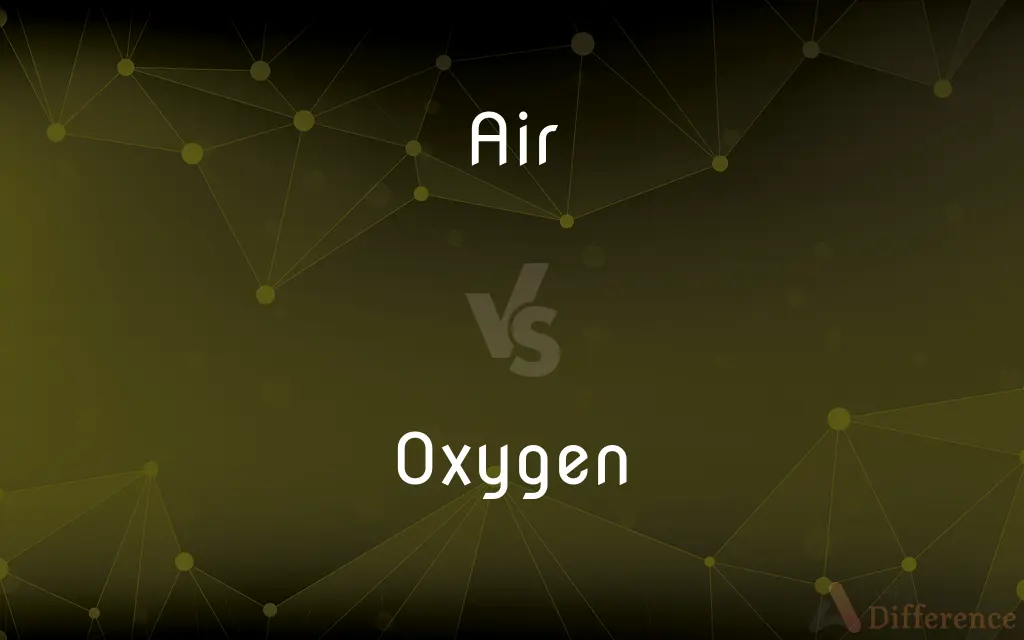Air vs. Oxygen — What's the Difference?
By Fiza Rafique & Urooj Arif — Updated on March 13, 2024
Air is a mixture of gases surrounding Earth, primarily nitrogen and oxygen. Oxygen is a chemical element, vital for respiration in living organisms.

Difference Between Air and Oxygen
Table of Contents
ADVERTISEMENT
Key Differences
Air consists of about 78% nitrogen, 21% oxygen, and trace amounts of other gases like carbon dioxide and argon. Oxygen, on the other hand, is a pure element represented by the symbol O, crucial for combustion and cellular respiration.
While oxygen supports life and combustion, air's composition, including nitrogen and other gases, dilutes oxygen's reactivity, making environments safe for living organisms. Pure oxygen can be hazardous due to its high reactivity and potential to support rapid combustion.
The quality of air, affected by pollutants and particulates, is crucial for environmental and health concerns. Oxygen levels within air are relatively stable, but its purity is critical in medical and industrial applications, where high concentrations are often required.
Air is an insulating medium, playing a key role in Earth's climate and weather patterns, whereas oxygen, particularly in the ozone layer, protects life by absorbing harmful ultraviolet radiation.
Comparison Chart
Composition
Mixture of gases (78% N₂, 21% O₂, etc.)
Pure element (O)
ADVERTISEMENT
Role in Life
Provides necessary gases for respiration
Essential for cellular respiration
Reactivity
Less reactive due to mixture
Highly reactive, supports combustion
Environmental Impact
Quality affects health and climate
High concentrations can be hazardous
Usage
General breathing, weather patterns
Medical applications, industrial processes
Compare with Definitions
Air
A mixture of gases that surrounds Earth, essential for life and climate.
The mountain air was fresh and crisp, filled with the scents of pine and earth.
Oxygen
A chemical element, essential for respiration and combustion, represented by the symbol O.
Oxygen is administered in hospitals to support patients with respiratory difficulties.
Air
Involved in various natural and human processes, from breathing to weather.
Air currents and temperatures play a crucial role in weather patterns and climate systems.
Oxygen
Highly reactive, supporting life and combustion.
Pure oxygen can dramatically accelerate combustion, used in industrial processes and rocketry.
Air
Primarily nitrogen and oxygen, with trace amounts of other gases.
The air's composition includes a small but crucial amount of carbon dioxide for plant photosynthesis.
Oxygen
Essential in high concentrations for various applications.
Oxygen tanks are crucial for scuba diving, allowing divers to breathe underwater.
Air
Supports respiration and maintains Earth's climate.
Air quality is vital for health, as pollutants can harm respiratory and cardiovascular systems.
Oxygen
High concentrations can be hazardous due to increased reactivity.
Oxygen-rich environments must be managed carefully to prevent fire hazards.
Air
Relatively stable, supporting life without excessive combustion risks.
The air, with its balanced composition, supports a stable environment for diverse ecosystems.
Oxygen
Part of the ozone layer, protecting life from UV radiation.
The ozone layer, composed of oxygen molecules, absorbs and shields the Earth from harmful ultraviolet light.
Air
The invisible gaseous substance surrounding the earth, a mixture mainly of oxygen and nitrogen.
Oxygen
Oxygen is the chemical element with the symbol O and atomic number 8. It is a member of the chalcogen group in the periodic table, a highly reactive nonmetal, and an oxidizing agent that readily forms oxides with most elements as well as with other compounds.
Air
An impression of a quality or manner given by someone or something
He leaned over with a confidential air
She answered with a faint air of boredom
Oxygen
A colourless, odourless reactive gas, the chemical element of atomic number 8 and the life-supporting component of the air.
An oxygen supply
If breathing stops, there is no oxygen getting to the brain and the cells begin to die
Hydrogen and carbon in the fuel combine with the oxygen in the air to form carbon dioxide and water
Air
A tune or short melodious song
Traditional Scottish airs sung in the Gaelic tongue
Oxygen
A nonmetallic element constituting 21 percent of the atmosphere by volume that occurs as a diatomic gas, O2, and in many compounds such as water and silica, and in iron ore. It combines with most elements, is essential for plant and animal respiration, and is required for nearly all combustion. Ozone, O3, is an allotrope of this element. Atomic number 8; atomic weight 15.9994; melting point -218.79°C; boiling point -182.9°C; gas density at 0°C 1.429 grams per liter; valence 2. See Periodic Table.
Air
A jump off the ground on a snowboard or skateboard.
Oxygen
The chemical element (symbol O) with an atomic number of 8 and relative atomic mass of 15.9994. It is a colorless and odorless gas. Category:en:Oxygen
Air
Express (an opinion or grievance) publicly
A meeting in which long-standing grievances were aired
Oxygen
Molecular oxygen (O2), a colorless, odorless gas at room temperature, also called dioxygen.
Air
Expose (a room) to the open air in order to ventilate it
The window sashes were lifted regularly to air the room
Oxygen
(medicine) A mixture of oxygen and other gases, administered to a patient to help them breathe.
Air
A colorless, odorless, tasteless, gaseous mixture, mainly nitrogen (approximately 78 percent) and oxygen (approximately 21 percent) with lesser amounts of argon, carbon dioxide, hydrogen, neon, helium, and other gases.
Oxygen
(countable) An atom of this element.
Air
This mixture with varying amounts of moisture and particulate matter, enveloping the earth; the atmosphere.
Oxygen
(figurative) A condition or environment in which something can thrive.
Silence is the oxygen of shame.
They hoped to starve the terrorists of the oxygen of publicity.
Air
The sky; the firmament.
Oxygen
A colorless, tasteless, odorless, gaseous element of atomic number 8, occurring in the free state in the atmosphere, of which it forms about 23 per cent by weight and about 21 per cent by volume, being slightly heavier than nitrogen. Symbol O. Atomic weight 15.9994.
Air
A giant void; nothingness
The money vanished into thin air.
Oxygen
Chlorine used in bleaching.
Air
An atmospheric movement; a breeze or wind.
Oxygen
A nonmetallic bivalent element that is normally a colorless odorless tasteless nonflammable diatomic gas; constitutes 21 percent of the atmosphere by volume; the most abundant element in the earth's crust
Air
(Sports) A height achieved by a jump or as part of an airborne maneuver, as in skateboarding or snowboarding
Getting big air off the halfpipe.
Had big airs on every run down the course.
Air
Aircraft
Send troops to Europe by air.
Air
Public utterance; vent
Gave air to their grievances.
Air
The medium of broadcast radio or television
"often ridiculed ... extremist groups on air" (Christian Science Monitor).
Air
A manner of behaving that conveys an impression
A leader with an air of conviction.
Air
A distinctive quality or appearance; an aura
The messy room had an air of desperation to it.
Air
The general environment or condition, as in attitudes and ideas
Growing impatience in the air.
Air
Airs Affected behavior; affectation
Put on airs.
Air
A melody or tune, especially in the soprano or tenor range.
Air
A solo with or without accompaniment.
Air
Air conditioning.
Air
(Archaic) Breath.
Air
To expose to the air in order to dry, cool, or freshen; ventilate.
Air
To make known to others; express publicly
Aired my complaints.
Air
To broadcast on television or radio
"The ad was submitted to CBS ... which accepted and aired it" (New York).
Air
To be broadcast on television or radio
"tidbits that will air on tonight's 6 o'clock news" (Terry Ann Knopf).
Air
Of or relating to the air or the movement of air
An air tube.
Air
Existing or living in the air; aerial.
Air
Powered by compressed air
An air horn.
Air
Containing or inflated by air.
Air
Of or relating to aircraft or aeronautics.
Air
Of or relating to the broadcast or transmission of radio or television signals.
Air
Imaginary or unreal
"The guy had just hit it big ... after ten years of eating air sandwiches" (Jonathan Kellerman).
Air
The substance constituting Earth's atmosphere, particularly:
I'm going outside to get some air.
The air on Mars is so thin that high and low temperatures on the day differ a lot.
Air
Understood as one of the four elements of the ancient Greeks and Romans.
Air
Understood as a particular local substance with supposed effects on human health.
There was a tension in the air which made me suspect an approaching storm.
Air
(physics) understood as a gaseous mixture of nitrogen, oxygen, and various trace gases.
Air
The apparently open space above the ground which this substance fills, (historical) formerly thought to be limited by the firmament but (meteorology) now considered to be surrounded by the near vacuum of outer space.
The flock of birds took to the air.
Air
A breeze; a gentle wind.
Air
A feeling or sense.
To give it an air of artistry and sophistication
Air
A sense of poise, graciousness, or quality.
Air
Pretension; snobbishness; pretence that one is better than others.
Putting on airs
Air
(music) A song, especially a solo; an aria.
Air
(informal) Nothing; absence of anything.
Air
An air conditioner or the processed air it produces.
Could you turn on the air?
Hey, did you mean to leave the airs on all week while you were on vacation?
Air
Any specific gas.
Air
A jump in which one becomes airborne.
Air
A television or radio signal; (by extension) media broadcasts in general.
Air
(uncountable) Publicity.
Air
To bring (something) into contact with the air, so as to freshen or dry it.
Air
To let fresh air into a room or a building, to ventilate.
It's getting quite stuffy in this room: let's open the windows and air it.
Air
To discuss varying viewpoints on a given topic.
Air
(transitive) To broadcast (a television show etc.).
Air
(intransitive) To be broadcast.
This game show first aired in the 1990s and is still going today.
Air
To ignore (a person).
Why is this girl airing me?
Air
The fluid which we breathe, and which surrounds the earth; the atmosphere. It is invisible, inodorous, insipid, transparent, compressible, elastic, and ponderable.
Air
Symbolically: Something unsubstantial, light, or volatile.
He was still all air and fire.
Air
A particular state of the atmosphere, as respects heat, cold, moisture, etc., or as affecting the sensations; as, a smoky air, a damp air, the morning air, etc.
Air
Any aëriform body; a gas; as, oxygen was formerly called vital air.
Air
Air in motion; a light breeze; a gentle wind.
Let vernal airs through trembling osiers play.
Air
Odoriferous or contaminated air.
Air
That which surrounds and influences.
The keen, the wholesome air of poverty.
Air
Utterance abroad; publicity; vent.
You gave it air before me.
Air
Intelligence; information.
Air
A musical idea, or motive, rhythmically developed in consecutive single tones, so as to form a symmetrical and balanced whole, which may be sung by a single voice to the stanzas of a hymn or song, or even to plain prose, or played upon an instrument; a melody; a tune; an aria.
Air
The peculiar look, appearance, and bearing of a person; mien; demeanor; as, the air of a youth; a heavy air; a lofty air.
Air
Peculiar appearance; apparent character; semblance; manner; style.
It was communicated with the air of a secret.
Air
An artificial or affected manner; show of pride or vanity; haughtiness; as, it is said of a person, he puts on airs.
Air
The representation or reproduction of the effect of the atmospheric medium through which every object in nature is viewed.
Air
The artificial motion or carriage of a horse.
Air
To expose to the air for the purpose of cooling, refreshing, or purifying; to ventilate; as, to air a room.
It were good wisdom . . . that the jail were aired.
Were you but riding forth to air yourself.
Air
To expose for the sake of public notice; to display ostentatiously; as, to air one's opinion.
Airing a snowy hand and signet gem.
Air
To expose to heat, for the purpose of expelling dampness, or of warming; as, to air linen; to air liquors.
Air
A mixture of gases (especially oxygen) required for breathing; the stuff that the wind consists of;
Air pollution
A smell of chemicals in the air
Open a window and let in some air
I need some fresh air
Air
Travel via aircraft;
Air travel involves too much waiting in airports
If you've time to spare go by air
Air
The region above the ground;
Her hand stopped in mid air
He threw the ball into the air
Air
Medium for radio and television broadcasting;
The program was on the air from 9 til midnight
The president used the airwaves to take his message to the people
Air
A slight wind (usually refreshing);
The breeze was cooled by the lake
As he waited he could feel the air on his neck
Air
A distinctive but intangible quality surrounding a person or thing;
An air of mystery
The house had a neglected air
An atmosphere of defeat pervaded the candidate's headquarters
The place had an aura of romance
Air
The mass of air surrounding the Earth;
There was great heat as the comet entered the atmosphere
It was exposed to the air
Air
A succession of notes forming a distinctive sequence;
She was humming an air from Beethoven
Air
Once thought to be one of four elements composing the universe (Empedocles)
Air
Expose to fresh air;
Aerate your old sneakers
Air
Be broadcast;
This show will air Saturdays at 2 P.M.
Air
Broadcast over the airwaves, as in radio or television;
We cannot air this X-rated song
Air
Make public;
She aired her opinions on welfare
Air
Expose to warm or heated air, so as to dry;
Air linen
Air
Expose to cool or cold air so as to cool or freshen;
Air the old winter clothes
Air out the smoke-filled rooms
Air
Relating to or characteristic of or occurring in the air;
Air war
Air safety
Air travel
Sea stories
Sea smells
Sea traffic
Common Curiosities
Can we breathe pure oxygen?
Breathing pure oxygen for short periods is safe, but prolonged exposure can be harmful due to oxygen toxicity.
What role does oxygen play in the ozone layer?
Oxygen molecules in the ozone layer absorb ultraviolet radiation, protecting Earth from harmful solar rays.
How does oxygen support combustion?
Oxygen reacts with other substances during combustion, releasing energy in the form of heat and light.
Why is air mostly nitrogen and not oxygen?
Nitrogen dilutes oxygen's reactivity, creating a stable atmosphere conducive to life.
How do air and oxygen relate to climate change?
Air composition, including greenhouse gases, influences climate change, while oxygen levels play a less direct role.
Why is pure oxygen used in medical treatments?
Pure oxygen can support or improve oxygenation in patients with respiratory conditions.
How do plants contribute to air quality?
Plants absorb carbon dioxide and release oxygen, improving air quality and supporting life.
Is oxygen the most important gas in the air for humans?
Oxygen is crucial for human respiration, but the balance of gases in air is essential for a habitable environment.
What is the main difference between air and oxygen?
Air is a mixture of gases, including oxygen, while oxygen is a pure chemical element essential for life.
How do pollutants affect air quality?
Pollutants can degrade air quality, affecting health, climate, and the environment.
What are the uses of oxygen in industries?
Oxygen is used in various industries, including healthcare, welding, and water treatment.
What is the significance of air in weather patterns?
Air movement and temperature differences drive weather patterns and climate systems.
What are the risks of high oxygen concentrations?
High oxygen levels can increase fire risk and cause health issues such as oxygen toxicity.
How does air pollution impact human health?
Air pollution can lead to respiratory, cardiovascular diseases, and other health issues.
Can changes in air composition affect oxygen levels?
Significant changes can affect oxygen levels, but the Earth's systems generally maintain a stable balance.
Share Your Discovery

Previous Comparison
Bear vs. Pig
Next Comparison
Jumper vs. CardiganAuthor Spotlight
Written by
Fiza RafiqueFiza Rafique is a skilled content writer at AskDifference.com, where she meticulously refines and enhances written pieces. Drawing from her vast editorial expertise, Fiza ensures clarity, accuracy, and precision in every article. Passionate about language, she continually seeks to elevate the quality of content for readers worldwide.
Co-written by
Urooj ArifUrooj is a skilled content writer at Ask Difference, known for her exceptional ability to simplify complex topics into engaging and informative content. With a passion for research and a flair for clear, concise writing, she consistently delivers articles that resonate with our diverse audience.














































